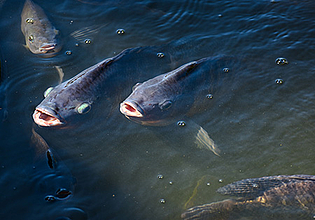Lectures & Discussions
Sustainable Aquaculture – Environmental Impacts and Food Security

Image: AdobeStock/neenawat555
Workshop
| Date: | Monday, 16 to Thursday, 19 October 2023 |
| Location: | Leibniz Institute of Freshwater Ecology and Inland Fisheries, Müggelseedamm 310, 12587 Berlin |
The Brazilian Academy of Sciences (ABC) and the German National Academy of Sciences Leopoldina co-organize the workshop “Sustainable Aquaculture – Environmental Impacts and Food Security” from 16-19 October 2023 in Berlin. It is the fourth event of a workshop series on water, mainly designed for postdoctoral researchers. Two goals are in focus: 1) bringing together early career scientists from South America and Europe to identify needs for political action in relevant fields and 2) empowering participants in policy advice. The objective of the forthcoming workshop is to review, assess and discuss current and emerging challenges for and needs in sustainable aquaculture. The final outcome will be a policy brief published and distributed by both Academies.
Climate change affects where, how and when water, specifically freshwater, as a resource becomes available. Unevenly distributed rainfalls and droughts increasingly make water a limiting resource. The competitive use and scarcity of freshwater challenge food security. However, aquaculture – if sustainably implemented – may serve as a resource-efficient and low-impact protein source for people globally.
Given the critical water-food nexus, two thoughts guide the workshop: First, it assesses the environmental impacts on and by aquaculture in freshwater and transition waters. A systemic approach considering water as a resource as well as an ecosystem is urgently needed. The workshop will identify ways forward in using water sustainably and circularly. Second, it debates aquaculture's prospect as an essential component of the global food production system. Due to the multiplicity and interdependence of ongoing crises, the policy brief should provide insights into the global food production challenge under changing climate conditions – with aquaculture in the focus.
The workshop has the following objectives:
- discuss the opportunities and challenges of sustainable aquaculture in freshwaters and transition waters
- promote aquaculture as a viable and alternative source for protein nutrition in the Global South and Global North
- develop policy advice by a compact policy brief
- empower early career scientists in providing scientific policy advice
- create a platform and stimulating atmosphere for scientific networking
The scientific coordinators of this workshop are:
- Professor Adalberto Val, Academia Brasileira de Ciências;
- Professor Evoy Zaniboni Filho, Federal University of Santa Catarina
- Professor José Galizia Tundisi, Academia Brasileira de Ciências
- Professor Maria Célia Portella (Sao Paulo State University (UNESP))
- Professor Werner Kloas, Leibniz-Institute of Freshwater Ecology and Inland Fisheries (IGB)
- Professor Klement Tockner ML, Senckenberg Society for Nature Research
ML = Member of the Leopoldina
Further information on the public event on 17 October
As part of the Workshop, a keynote and a roundtable discussion will take place from 16:00 – 20:00 pm on Tuesday, October 17. They are open for an interested public. For information please visit From Aquafarm to Fork? Sustainable Aquaculture as Part of a Resilient Global Food System
Contact
Dr Thomas Plötze
International Relations Department
Tel.: +49 (0)345 472 39 834
Email: thomas.ploetze@leopoldina.org
